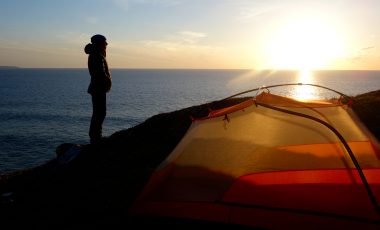Spending time on your own is something that many people try to avoid at all costs. So why on earth would camping alone be something one would want to pursue?
There are loads of proven benefits to spending time on your own including freedom and independence, as well as thinking time. Coupled with the numerous benefits of spending time in nature and camping alone could be one heck of a productive and life-broadening activity.
In this article you’ll learn why camping alone isn’t weird but is a highly enlightening thing to do! Plus, I’ll take you through how to gently move from a world of sociable camping to one in which it’s just you, your tent (and a few other essentials!) and nature.
Breath in. Breath out. Now let’s take a small leap outside of our comfort zones!
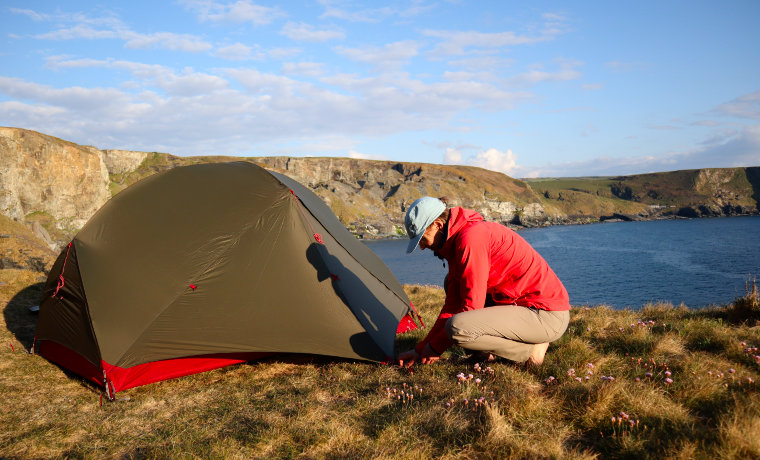
7 benefits of camping alone
If you’re an introvert or love time on your own then it will probably be fairly easy to imagine all the potential benefits of solo camping. However, if time alone isn’t your natural inclination, you may need a little convincing. Here are a few ways in which you can benefit from camping alone:
01Freedom
One of the best things about camping alone is that you can do what you want, when you want! You can be on your own schedule with no-one else to answer to. This may sound selfish, but in a world where we’re constantly making decisions with other people in mind, it can feel incredibly liberating to only think about yourself and your wants and needs. If you fancy lying in bed until noon then go for it!
02You can go anytime
Another positive element of the freedom of solo camping is that you’re not dependent on others to plan and carry out your getaway. If camping isn’t your friends’ idea of fun then you can just go anyway! This also adds a huge degree of spontaneity to your hobby. An unexpected early finish from work coinciding with stella weather means you can sneak in a cheeky midweek 5-9er. Add in other people and it’s very unlikely to materialise without prior planning.
03Time alone can lower stress
In our modern world of constant noise and chatter and people, it can instantly feel relieving to take a step away from things. It’s not called a ‘get-away’ for nothing. This Solitude Project study found that when individuals actively chose to be alone, solitude could lead to relaxation and reduced stress. To ensure that this state of calm isn’t negated by any negative feelings surrounding the responsibility of making sure your solo camping trip is safe and successful, do a thorough planning session, taking in all the below tips and advice.
04You’ll learn a lot about yourself
With no-one else to focus your attention on, camping on your own means that you can give yourself your full attention. You’ll be more aware of your feelings and actions or lack of them, which may feel a little uncomfortable to start with. But if you’re able to just observe rather than act on how you feel then you’ll soon start to notice things about yourself you never knew before.
05It boosts your confidence and helps build mental strength
Camping alone can be challenging. You’ll have to make decisions on your own and tackle changes or mishaps without help from anyone else. But so long as you have a bit of camping experience under your belt, you’ll get through it and realise that you’re much more capable than you might have given yourself credit for. You’ll come away with a glowing feeling of independence, bravery and confidence that unavoidably carries over into everyday life.
06Reflection time
Whenever I go camping alone I get really excited about all that thinking time I’ll have. I even plan things to think about. For me, however, the reality of this is that I get a bunch of thinking done to start with and then I end up thinking about very little. Everyone is different in this regard. But either way, being alone in the wild provides space and time to have a good old think, or not!
07You’ll feel closer to nature
Feeling and getting closer to nature is probably my favourite thing about solo camping. Firstly, you’re much quieter on your own than with other people. This means that you’re less likely to scare off any nearby wildlife. Secondly, without the distraction of camping companions, you’re much more likely to notice things in nature. Unusual plants or wacky insects all go unnoticed when I’m around others. On my own, however, I see, hear, touch and feel so much more.
Ah, just writing this makes me want to pack my bag and hit the trail on my own right now!
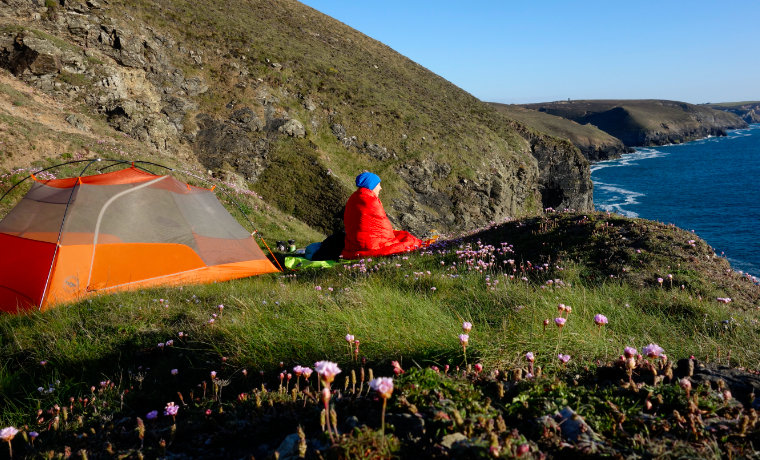
Camping alone for the first time
My first solo camping experience didn’t follow any of the below advice! I cycled 70 miles across Wales, camped in the dunes by the sea and then cycled back! It wasn’t close to home and I had no idea where I was going to end up sleeping. However, there were a few things I was well prepared for. The weather forecast was perfect. I also had some public transport options and knew there were some campsites close by if I couldn’t find anywhere wild to camp. So essentially, I had a back up plan.
As it happens, my basic plan worked out pretty well and I spent a moonlit night sleeping under the stars with nothing but the seagulls for company.
Was I nervous or scared sleeping alone? Absolutely! But I was in communication with someone at home if I needed to be, and the big bike ride meant that I ended up sleeping like a baby!
Start simply and locally
If you’ve never camped on your own before then it’s a good idea to start simply and locally. Start by gauging where your comfort zone sits and then push yourself just outside of it. Camping in your backyard is a great place to start to help you figure out where you’re at. If this is super easy then book a spot in a local campsite. This will pose a whole new set of challenges, some of which might be unexpected!
If that’s a breeze for you then maybe book into a campsite further from home, or a walk-in campsite which will feel more remote but still with facilities and a degree of security. Then after that, it might be time to go solo camping in the wild!
Read our wild camping alone section for some top tips.
Take some entertainment
Some of you might be perfectly content just sitting and being, taking in the sights and sounds of nature around you, chatting with fellow campers. But this might feel uncomfortable to start with, or even boring. It’s worth trying it for a bit. But having a few things to keep you entertained might also be a good idea. After all, camping alone should be enjoyable, not a sufferfest!
Here are a few camping alone activities ideas:
- Play solo card games like solitaire.
- Bird / nature spotting – take a nature guide book and some binoculars.
- Camp craft – whittle a spoon or some tent stakes.
- Read an adventure book – nothing will make you feel more inspired to adventure more.
- Write in a journal – you might stumble upon some interesting insights into your experience.
- Write a story – being alone might give your brain space to develop ideas.
- Draw or paint – it’s a good way to really harness the stress relieving effects of being alone.
- Cook something new – you’ll have time to try a new recipe and only you to let down if it doesn’t go to plan!
- Experiment with your camera – getting artsy photos will be an excellent record of your trip too
- Go foraging – just ensure you know what you’re doing
Double check your gear
One of the benefits of solo camping is that you have to be self-reliant. This means dealing with whatever you may encounter (bad weather, broken gear, forgotten food!) on your own. To help counter this, it’s always worth checking and double checking your gear. Check that your tent has poles and pegs! Make sure your sleeping bag zip works. Ensure you have enough food and cooking fuel. And always pack more than one way of lighting your stove!
Print our camping checklist to help make sure you have everything you need.
Anticipate discomfort!
Everyone knows that sleeping in a tent doesn’t equate to the most restful or comfortable sleep. But I’m not talking about physical discomfort. Camping alone might make you feel emotionally uncomfortable. You might feel scared and vulnerable. Maybe even a bit lonely. But anticipating this will certainly help if those feelings do come up. You may even be able to put some things in place to prevent those feelings in the first place or at least be better able to deal with them if they do. No, I’m not suggesting watching YouTube videos on your phone all night! But mindfulness exercises, drawing or journaling is a great place to start.
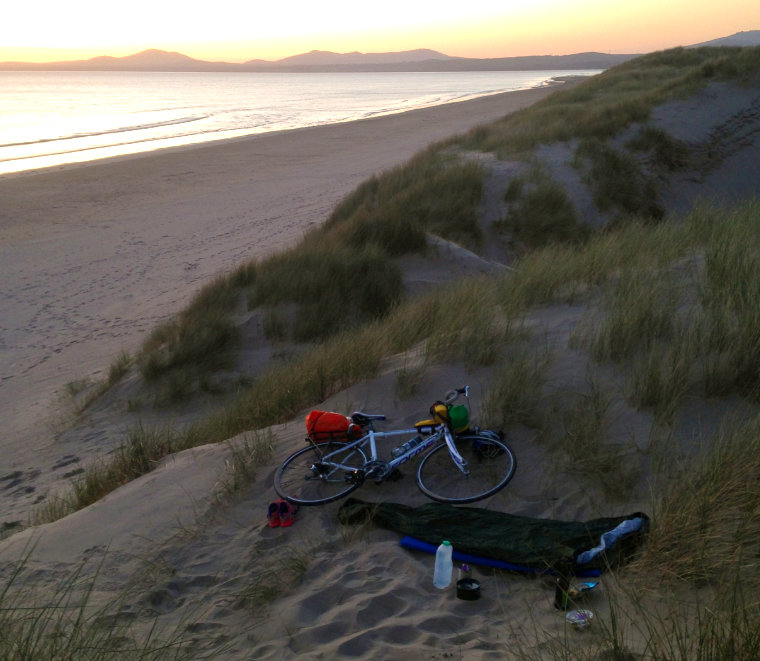
Wild camping alone
Many of you will stop at camping alone in the relative comfort and security of a campground. And that’s fine! You’ve achieved your goal of spending the night on your own in a new place in your tent. Well done!
For those who are ready to take a bigger leap outside of your comfort zone and deeper into the wild, I can highly recommend wild camping on your own. I would also highly recommend wild camping with other people before you leap feet first into doing it on your own. Camping wild is a very different experience that is wonderful to share with other people. But it also requires a degree of experience and confidence in your own skills to ensure it’s done safely and sensibly.
Once you’ve got some experience wild camping with other people, these top tips will help you transition to wild camping alone:
Camp close to home
If at all possible, don’t travel too far from home. Finding out that you really, really hate wild camping alone when you don’t have another option isn’t ideal. Of course, there will be some of you out there who will relish the challenge of pushing through this feeling. But for others, it could be highly stressful and anxiety inducing.
If you’re at all worried about this then having the ability to abandon your mission is always sensible. It’s likely that you’ll be fine. But part of that might just be the knowledge that you have another option.
Choose an area with good phone reception
Again, some of you might seek out places where you can’t contact the outside world. If you’re experienced and have good safety procedures in place then this will mitigate some of the risk. However, should an accident or incident happen, you really are at the mercy of the elements and is therefore never advisable.
Much like your ability to abandon ship, if needed, the presence of phone reception is likely to make you feel a little more secure. Just make sure your battery is charged!
Camp discreetly and leave no trace
One of the first rules of wild camping is to be stealth about it. The less attention you draw to yourself the better. That means no fires and take everything with you when you leave. In some scenarios it may also mean waiting until after dark before you put up your tent or shelter. This is highly beneficial for the wider wild camping community as it means that landowners or locals won’t attempt to shut down access to wild spaces.
Camping discreetly will also make you feel more secure, especially if your mind might get the better of you after dark; if strangers don’t know you’re there then they won’t come looking for you!
For more tips read our article on stealth camping and take our Leave No Trace Quiz!
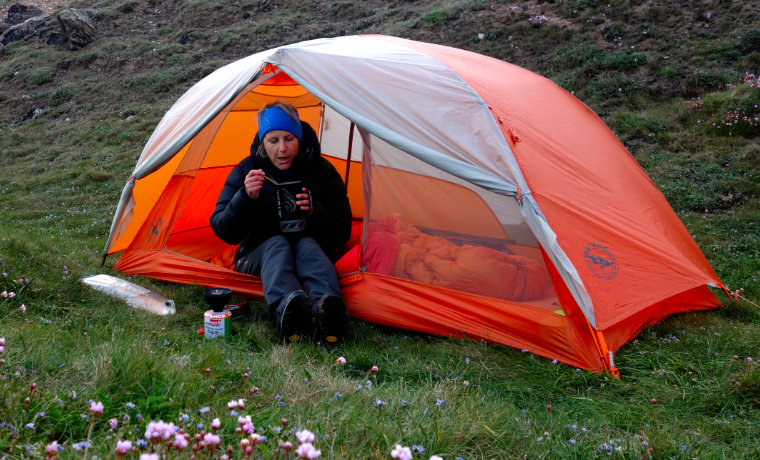
Consider avoiding camping in or near woodland
Despite the fact that woodland camping is an excellent way to remain unseen, being in the forest on your own can be mega creepy! Some of you may feel more secure surrounded by trees and with a canopy above you, but for me, the forest is just full of unknowns. Every squirrel hopping on a twig or pine cone falling from a branch is someone (or something) out to get me! Of course, it’s all in my head and it probably is safer in the woods than out in the open air. But for me, it doesn’t feel like it. I don’t even like being on the edge of woodland.
Another reason to be cautious when camping in forests is the potential for falling branches onto you in your sleep. This can be especially risky in windy conditions. They don’t call them the widow-makers for nothing.
Check the weather forecast
Then check it again! Solo camping in good weather is VERY different to solo camping in bad weather. Small tasks like securing your tent down in the wind and rain are much more tricky (and un-fun) on your own, not to mention the elevated potential for things to go wrong due to wind, rain or snow.
Consider that the weather in coastal and mountainous areas can change very quickly, despite the forecast. So if conditions take a turn for the worse, don’t be afraid to turn around and head home.
Ensure your camping spot is safe from natural hazards
Falling branches aren’t the only thing you’ll need to avoid when choosing your stealth camping spot. You’ll also need to consider the following:
- Flash flood potential if you’re near a river
- Tidal changes if you’re by the sea
- Bears and other dangerous wildlife
- Falling rocks from cliffs above you
- Camping near the edge of unstable cliffs
- Trip hazards (if you get up in the night)
- Changing water levels if you’re next to a dammed lake
- Avalanche risk if camping in winter
- Landslips if you’re below slopes
Share your plans
Any time you head out into the wild you should share your plans with someone at home or the local park ranger. This is even more essential when you are on your own. Ensure that you create as detailed a plan as you can, including rough timings, and share it with more than one person. That way, should something happen to you, you’ll know that there’s a rescue team on their way within hours of your scheduled return time.
Go on a reccy mission
One of the best ways to ensure that all of the above points are covered, is to check out your camping spot before you stay there.
A reccy mission allows you to consider all the possible places that might be suitable to sleep for the night. It’ll also give you a good idea of timings for travel or your hike in, which will make the plan you’ll share with others as accurate as possible.
Whenever I’m hiking near my home I’m always on the lookout for good places to camp. I assess how flat the ground is, potential hazards, how discreet the spot is and how sheltered it is from the wind. Then I bank them in my head for future solo camping missions.
Whether you set up your tent in your backyard or are ready for a multi-day trip into the wilderness, camping alone can be loads of fun and hugely beneficial on so many levels. However you choose to do it, ensure you tell someone your plans and as any good Scout will tell you, be prepared!


